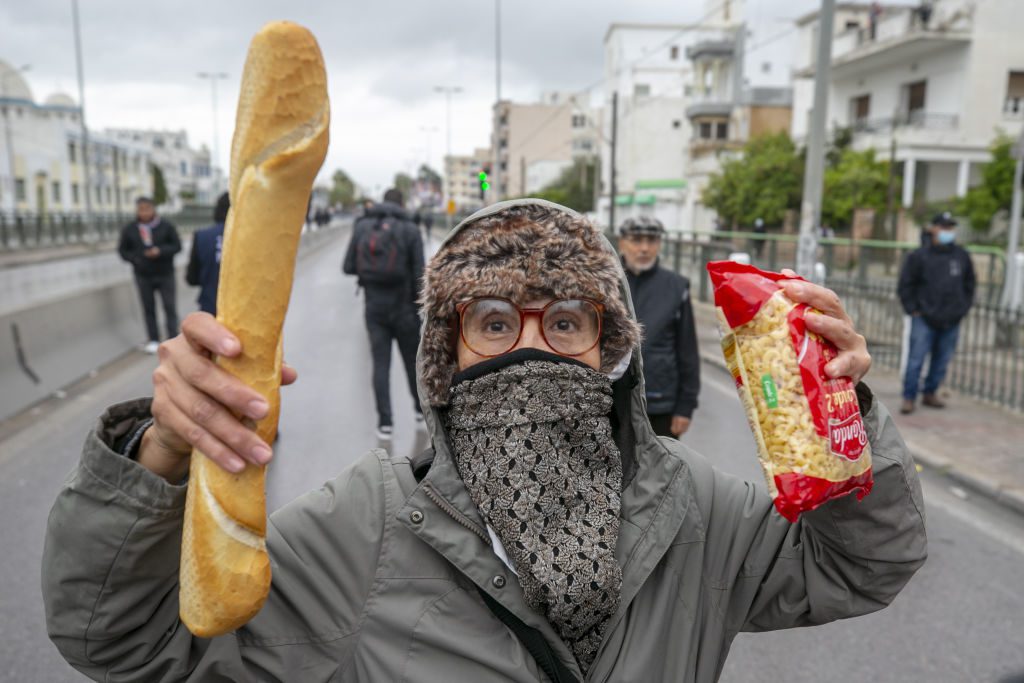A new law issued by President Kais Saied as part of what he has described as a campaign against goods speculators poses a serious threat to freedom of expression, Amnesty International said today. Decree-Law 2022-14, which went into effect on 21 March 2022, contains vaguely worded provisions that could lead to prison terms of between ten years and life including for public debate of the economy.
The decree-law criminalises the deliberate spread of “false or incorrect news or information” that would cause consumers to refrain from buying, or to disrupt the supply of goods to markets and thereby cause prices to rise. While acts to influence markets through fraudulent means are legitimate grounds for concern, sweeping laws such as decree-Law 2022-14 open the door to unfair and abusive prosecutions.
Tunisia is facing growing shortages of goods, including staple foods such as grain and sugar. Food supplies are under further pressure from the ongoing war in Ukraine, from which Tunisia imports much of its wheat.
“Tunisia is already suffering a long-standing economic and financial crisis. It is more important than ever that people in the country be free to discuss and debate the issues that affect them, including food security and goods supplies, without fear of prosecutions,” said Amna Guellali, Deputy Regional Director for the Middle East and North Africa at Amnesty International.
“Instead of seeking to criminalize those who express themselves freely about good supplies, the authorities should step up their efforts to ensure that they disseminate reliable, accessible, and trustworthy information as the best way to counter misinformation and protect human rights.”
Article 19 of the International Covenant on Civil and Political Rights (ICCPR), to which Tunisia is a state party, guarantees the right to freedom of expression. While governments may restrict expression to protect specified public interests, restrictions must be provided by a law formulated with sufficient precision to enable individuals to regulate their conduct accordingly, and must be demonstrably necessary and proportionate to achieve the specified purpose.
Blanket prohibitions on the dissemination of information, based on vague and ambiguous concepts such as spreading false or incorrect information, fail this test and are therefore incompatible with international human rights law. Such measures put in jeopardy the right of freedom of expression itself and are not the least restrictive means to achieve the desired objective.
“Decree-Law 2022-14 risks creating a chilling effect that dissuades people from openly discussing food supplies and food security for fear of reprisal. The new decree-law is the latest in a string of blows to human rights since President Saied suspended parliament last July and began concentrating power in the executive branch,” said Amna Guellali.
Decree-Law 2022-14 risks creating a chilling effect that dissuades people from openly discussing food supplies and food security for fear of reprisal.
Amna Guellali, Amnesty International
Background
Article 2 of decree-law 2022-14 states that its provisions apply to those engaged in economic activities. Article 17 provides for prison terms ranging from 10 years to life in prison, depending on the circumstances, for acts defined as goods speculation.
On 25 July 2021, President Saied suspended parliament and dismissed then-Head of Government Hichem Mechichi, citing emergency powers he said were granted to him by Tunisia’s constitution. He has since suspended most of the constitution and granted himself the exclusive right to legislate by decree-laws.
On 12 February, President Saied undermined judicial independence by granting himself broad powers to intervene in the appointment and career tracks of judges and prosecutors, and to initiate dismissal proceedings against them.


